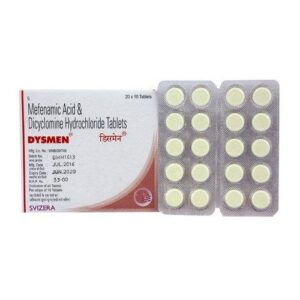DICYCLOMINE + MEFENAMIC ACID
Dicyclomine: Dicyclomine is a prescription medication that belongs to a class of drugs known as anticholinergics. It is primarily used to treat symptoms associated with irritable bowel syndrome (IBS), such as abdominal pain, cramping, and bloating.
The mechanism of action of dicyclomine involves blocking the action of acetylcholine, a neurotransmitter that is involved in several bodily functions, including the movement of smooth muscles in the gastrointestinal tract. By inhibiting acetylcholine, dicyclomine helps to relax the smooth muscles in the intestines, relieving symptoms of IBS.
Dicyclomine is available in tablet form, with doses typically ranging from 10 to 20 mg. The recommended starting dose for adults is 20 mg, taken three to four times daily, before or with meals. The maximum daily dose should not exceed 80 mg.
Like any medication, dicyclomine can cause side effects. Common side effects may include:
1. Dry mouth
2. Dizziness
3. Blurred vision
4. Difficulty urinating
5. Constipation
6. Nausea
These side effects are usually mild and temporary. However, if any of these side effects become severe or persist, it is important to contact a healthcare professional.
It is worth noting that dicyclomine may not be suitable for everyone. It should be used with caution in individuals with certain medical conditions, such as glaucoma, myasthenia gravis, and urinary retention. Drug interactions may also occur, so it is essential to inform your healthcare provider about all medications and supplements you are taking before starting dicyclomine.
In summary, dicyclomine is a medication used to relieve symptoms associated with irritable bowel syndrome. Its mechanism of action involves blocking acetylcholine to relax the smooth muscles in the intestines. The dosage and frequency of dicyclomine may vary depending on the individual, and it can cause mild side effects such as dry mouth and dizziness. It is important to consult a healthcare professional before starting dicyclomine to ensure its appropriateness for your specific situation.
Mefenamic Acid: Mefenamic Acid is a nonsteroidal anti-inflammatory drug (NSAID) that is used to relieve pain and reduce inflammation. It belongs to the class of medicines known as fenamates.
It is commonly prescribed to treat menstrual pain (dysmenorrhea), as it helps reduce the severity of cramps and associated symptoms like back pain and headache. It can also be used to relieve pain caused by other conditions such as arthritis, dental pain, and post-surgical pain.
The exact mechanism of action of mefenamic acid is not fully understood, but it is believed to work by inhibiting the production of prostaglandins. Prostaglandins are hormone-like substances that contribute to pain and inflammation in the body. By suppressing their production, mefenamic acid helps to reduce pain and inflammation.
The typical recommended dose of mefenamic acid for adults is 500 mg initially, followed by 250 mg every 6 hours as needed. The total daily dose should not exceed 1,500 mg. It is important to take this medication with food or milk to minimize stomach upset.
Like other NSAIDs, mefenamic acid can cause certain side effects. Common side effects include stomach upset, nausea, vomiting, diarrhea, and headache. It may also cause dizziness or drowsiness, so operating heavy machinery or driving should be avoided until the individual knows how the drug affects them. In rare cases, it can lead to more serious side effects such as gastrointestinal bleeding, liver damage, and allergic reactions. If any severe side effects occur, it is important to seek medical attention immediately.
It is important to note that mefenamic acid may not be suitable for everyone, especially those with a history of stomach ulcers, bleeding disorders, kidney or liver disease, or asthma. It is advisable to consult a healthcare professional before starting this medication to ensure its suitability and to discuss any potential interactions with other medications.





